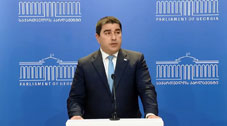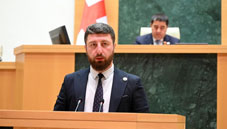Papuashvili Dismisses Elene Khoshtaria's Hunger Strike, Calls It 'Unethical Blackmail'

"I don't think Elene Khoshtaria's hunger strike changed anything," Papuashvili said. "She didn't show any physical signs of fasting, the country didn't feel that she had fasted, and neither did the opposition. They are exactly where they were three days ago."
Elene Khoshtaria and Gedevan Popkhadze were launched in protest after eight opposition parties announced they would not participate in the upcoming local self-government elections. The boycott was intended as a stance against what they call undemocratic conditions under the Georgian Dream government.
Papuashvili responded by downplaying the impact of the boycott itself. "I don't want to misstate the number, but I believe around 30 parties took part in the last parliamentary elections. Yesterday, they said there are eight of them who will not participate. They dissolved the coalition again just to inflate the numbers," he said. "Sometimes they present themselves as a coalition, and when they need to make the number look bigger, they break it up and list them as separate parties. If eight don't participate, twenty will. This has absolutely nothing to do with the elections. It's their own decision whether or not to participate."
He insisted that voters would still have a choice in the October elections: "The Georgian people will come out in October for the local elections, they will have a proper choice, and they will make that choice."
Papuashvili also condemned the hunger strike on ethical grounds, framing it as a manipulative tactic. "Announcing a hunger strike and trying to coerce others by threatening your own life is unethical," he said.
Parliament Fast-Tracks Bill Granting State Monopoly Over Narcotic Imports and Opioid Therapy

All three readings and the final adoption of the legislative package are scheduled for this week's extraordinary sessions.
According to the proposal, only legal entities established or controlled by the state will be allowed to import narcotic and psychotropic substances. The Ministry of Health will have the authority to grant exceptions on a case-by-case basis.
Opioid substitution therapy would also become the sole responsibility of the state.
Wholesale pharmaceutical distributors currently handling substances under special control will be required to transfer their remaining stocks to a state-established entity by March 1, 2026, in exchange for compensation.
The Ministry of Health and treatment providers must ensure that all ongoing opioid therapies continue without interruption by the same deadline.
Entities set up by the state to distribute controlled pharmaceuticals will be exempt from standard permitting requirements until January 1, 2029.
The bill was introduced by MPs from Georgian Dream and People's Power.
